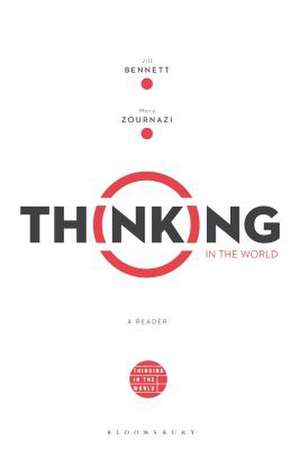Thinking in the World: A Reader: Thinking in the World
Editat de Jill Bennett, Mary Zournazien Limba Engleză Paperback – 25 dec 2019
| Toate formatele și edițiile | Preț | Express |
|---|---|---|
| Paperback (1) | 182.65 lei 22-36 zile | |
| Bloomsbury Publishing – 25 dec 2019 | 182.65 lei 22-36 zile | |
| Hardback (1) | 543.08 lei 43-57 zile | |
| Bloomsbury Publishing – 25 dec 2019 | 543.08 lei 43-57 zile |
Preț: 182.65 lei
Preț vechi: 209.97 lei
-13% Nou
Puncte Express: 274
Preț estimativ în valută:
34.95€ • 36.58$ • 29.09£
34.95€ • 36.58$ • 29.09£
Carte disponibilă
Livrare economică 10-24 martie
Preluare comenzi: 021 569.72.76
Specificații
ISBN-13: 9781350069220
ISBN-10: 1350069221
Pagini: 368
Dimensiuni: 156 x 234 x 25 mm
Greutate: 0.54 kg
Editura: Bloomsbury Publishing
Colecția Bloomsbury Academic
Seria Thinking in the World
Locul publicării:London, United Kingdom
ISBN-10: 1350069221
Pagini: 368
Dimensiuni: 156 x 234 x 25 mm
Greutate: 0.54 kg
Editura: Bloomsbury Publishing
Colecția Bloomsbury Academic
Seria Thinking in the World
Locul publicării:London, United Kingdom
Caracteristici
The contributors to this volume are both global (writers from France, The Netherlands, Finland, Australia, UK and US) and also represent different generations of thinkers: established voices, like Michel Serres and Mieke Bal, combined with up-and-coming new thinkers
Notă biografică
Jill Bennett is Professor of Visual Culture and Director of the National Institute for Experimental Arts, University of New South Wales, Australia. Her books include World Memory: Personal Trajectories in Global Time (2003), Empathic Vision (2005), Practical Aesthetics (I.B. Tauris, 2012) and New Media Art and Living in the Anthropocene (2013).Mary Zournazi is an Australian writer and philosopher. She teaches at the University of New South Wales, Australia and is the author of several books, including Hope - New Philosophies for Change (2003), Inventing Peace: A Dialogue on Perception (I.B. Tauris, 2013). Her book Keywords to War (2008) was made into a radio documentary for ABC Radio National in Australia, and it was nominated for the Australian UN Media Peace Prize in 2008.
Cuprins
List of Illustrations Introduction. Thinking in the worldJill Bennett (University of New South Wales, Australia) and Mary Zournazi (University of New South Wales, Australia) Part 1. Thinking worlds Chapter 1. Revolutions in thinkingMichel Serres (Stanford University, USA) and Mary Zournazi Chapter 2. The thinking that is in the worldAlphonso Lingis (Pennsylvania State University, USA) Part II. Senses of place Chapter 3. A phenomenology of thinking in placeEdward Casey (SUNY, Stony Book, USA) and Jeff Malpas (University of Tasmania, Australia) Chapter 4. Attunement as architectural meaning Alberto Perez-Gomez (McGill University, Canada) Part III. Extended minds and bodies Chapter 5. Embodying thought in skilful actionJohn Sutton (Macquarie University, Australia), Doris McIlwain (Macquarie University, Australia), Wayne Christensen (University of Warwick, UK) and Andrew Geeves (Independent Scholar, Australia)Chapter 6. What does the stick do for the blind? Lambros Malafouris (University of Oxford, UK) Part IV. Technologies Chapter 7. The distributed-centered subjectHélène Mialet (York University, Canada)Chapter 8. Dancing with the nonhuman Petra Gemeinboeck (University of New South Wales, Australia) Part V. Creativity Chapter 9. Thinking in film Mieke Bal (Emeritus Professor, University of Amsterdam, the Netherlands) Chapter 10. Thinking through the celloTim Ingold (University of Aberdeen, UK)Chapter 11. Aesthetic intelligenceJill Bennett and Lynn Froggett (University of Central Lancashire, UK) Part VI. Spectrums of experience Chapter 12. Reading Leslie Marmon Silko's Ceremony with autist Jamie Burke, or remembering the sensorimotor futureRalph James Savarese (Grinnell College, USA)Chapter 13. The philosophical role of illnessHavi Carel (University of Bristol, UK) Part VII. Economies, ecologies, politics Chapter 14. Thinking love and politics in the worldMichael Hardt (Duke University, USA) and Mary Zournazi Chapter 15. Thinking with interdependence: from economy/environment to ecological livelihoods Ethan Miller (Bates College, Maine, USA) and J.K. Gibson-Graham (Western Sydney University, Australia)
Recenzii
This volume is a remarkable collection of essays for its creative approach to the topic of thinking. The various essays effectively demonstrate the ways in which thinking does not merely take place in the brain but is embodied in our material and practical engagement with the world.
Here is a book to help us understand the ways we and the world are mutually obliged. A book leading us toward the ecological sensibility that we must learn quickly from the lively world that, for the moment, continues to host us.
Attuned to contemporary technologies that open new ways to engage mind-world relationships, this outstanding collection of critical and innovative phenomenological analyses provides a rich set of exciting interventions that respond in original ways to (both senses of) the question that Heidegger famously formulated: "What is Called Thinking?" / "What Calls for Thinking?"
Here is a book to help us understand the ways we and the world are mutually obliged. A book leading us toward the ecological sensibility that we must learn quickly from the lively world that, for the moment, continues to host us.
Attuned to contemporary technologies that open new ways to engage mind-world relationships, this outstanding collection of critical and innovative phenomenological analyses provides a rich set of exciting interventions that respond in original ways to (both senses of) the question that Heidegger famously formulated: "What is Called Thinking?" / "What Calls for Thinking?"




